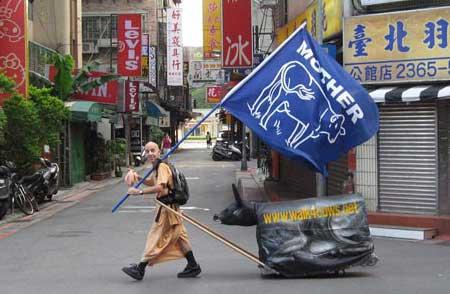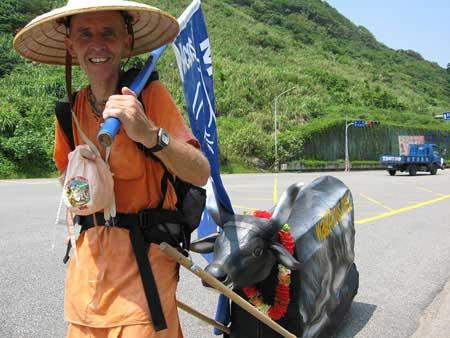By Lokanath Swami (excerpt from his upcoming Padayatra Story book)
Introduction by Gaurangi Dasi editor of the book):
Sankirtana Dasa quit his body last Janmastami, after a few years of struggle with cancer. He was certainly a valiant vaisnava soldier. Fully dedicated to the mission, willing to take risks and undergo austerities to spread the holy names and the glories of Sri Sri Radha Krisha. His name fitted him very well. He was truly humble and satisfied in himself. I never heard him complain, talk or gossip about others. He had no time and no desire for that. Krishna had chosen to free him from all material attachments, including his very body. I’m happy he left at such an auspicious moment.
To honor his memory and help us remember and appreciate him better, we’d like to share with all of you this section of the future padayatra book. You’ll see that Sankirtana Dasa very much wanted to continue padayatra around Taiwan. I pray that in his memory some devotees from Taiwan or from anywhere , will be inspired to organise more padayatras in that country, in any other country. Nitai Gaura Premanande !
Sankirtana Das and his black magic cow
In 2008 Sankirtana Dasa was not new to padayatra. He had first heard of padayatra in 1987. After ending his career as a book distributor in Europe that year, where he found the mood no longer suited him, he traveled to India. He was introduced to padayatra in V?nd?vana in1987 when he attended an information session led by Bhadra Dasa, who was recruiting devotees to join the walk from Vrindavana to Dwaraka. It was then Sankirtana realized that padayatra was just what he’d been looking for.
He went on to walk for almost a year in India, doing book distribution all along the way. “People are much less defensive there, and they reciprocated with us more than they did in the West,” he said. “In India you’re not a sect member but a genuine representative of a tradition. You have every reason to feel your value. In India you even take pride in being Srila Prabhupada’s representative, whereas in Europe you always have to fight that sect image they put on you.”
Tamal Krishna Maharaja, who had come to padayatra for a short visit, invited Sankirtana to Southeast Asia, where he preached in Taiwan for about six years. In 1995 he returned to India to assist the team at the Centennial Office in Delhi, coordinating the Sahasra Tirtha Jala project until the end of 1996. One of the aims of the Centennial was to have a hundred padayatras in one hundred countries, so Sankirtana corresponded with a devotee from Taiwan to encourage him to do padayatra there, but the walk never happened.
Sankirtana Dasa: I always had the idea to do a padayatra in Taiwan. In the summer of 2008 I went to Bali, where the devotees are very artistic. They helped me build a little ratha – basically, a cow with an aluminum body. It was very light. It was one meter long, one meter high, 40 centimeters wide, with had two small wheels of about 20 centimeters in diameter. It has two long wooden sticks for a harness. We made the small cow body with bamboo and then covered it in black fabric. It had a nice Styrofoam head with beautiful horns. Then I shipped it to Taiwan. There are three small centers in Taiwan, but no full-time devotees. I tried to get some local devotees to walk with me, but all of them had full-time jobs and couldn’t come during the day. But I wasn’t discouraged. I had planned it as a one-man performance. My idea was to first find out how it would be before inviting other devotees from abroad to walk around the whole island.
Sankirtana walked from Taipei to the northern half of the country in the beginning of September 2008. He was alone with his magic black cow! On the side of the cow he had written the name of his website in large yellow letters: “www.walk4cows.net.” Those who visited would have seen the several articles he had posted there related to cow care and the benefits bestowed by mother cow. His main message was that people should make an effort to break free from the oppressive industrial society, and that to accomplish this goal they needed to be educated in spiritual life.
Through a small door in the cow’s side he placed books, a mosquito net, a mat, an extra dhoti, a bucket, and some dried fruit and muesli. On top of the cow’s frame he installed a sound system and an MP3 player to constantly play Srila Prabhupada singing the maha-mantra. Few people speak English in Taiwan, but after having spent six years in Taiwan Sankirtana was fluent in Chinese. Communication wasn’t a problem.
Sankirtana Dasa: The first day out, one devotee came with me for a few kilometers to take pictures, and then I was alone. There are lots of weird people in Taiwan, and maybe some of those who saw me pulling this unusual cow, also thought I was weird! Sometimes people thought I was insane, but because I was shaved up and looked neat and clean, they realized I was indeed sane and appreciated that I was a monk. Despite an enormous modernization of the country during the past fifty years, the Taiwanese people have retained much of their culture and, with it, a service attitude toward monks, many stopping to offer me water, milk, or fruit. Many simply made gestures of approval. Whenever I got a donation I gave a little book in Mandarin, Elevation to Krishna Consciousness or Easy Journey to Other Planets. One time the leader of a Taoist group gave me the equivalent of $65. There were lots of exchanges as people invited me to sit with them and then asked me questions. Sometimes they stopped their cars to have a better look and talk with me. Without an advance party, I was able to find suitable resting places in either a Taoist or Buddhist temple or under cover in a housing area. A few times people invited me to stay in their homes for the night. Sometimes I would sleep in the open on a mat and under a mosquito net. I tried to stay near a petrol pump or temple, because then I would have water to bathe with in the morning. The next day I would get up, chant Hare Krishna, and walk 40 km from 6 a.m. until 9:30 p.m.
The impact on the public was positive. During the first six days of his walk, Sankirtana did two radio interviews and was featured in a newspaper article. The themes developed on his website – now receiving thirty visits a day – seemed to appeal to all classes of people, especially the elderly. In the past, the cow and the ox used to be somewhat respected for economic considerations – the milk she was giving and the labor he was providing – but China is now a heavy meat-eating country.
At some point, Sankirtana Dasa interrupted his walk to take some of his yoga students to India, resuming his place with his magic cow three weeks later for another seven days on other parts of the island.
Sankirtana Dasa: Basically, it was a trial run. I discovered that walking on the street with the cow ratha was not too risky and that the police patrols never seemed to bother with me. I wanted to see how it would be with more devotees. Now I can see that we can easily take a bigger cart, a bigger sound system, and a bigger battery. The difficulty is that it would be costly to fly a whole crew of foreign devotees to Taiwan. Usually foreigners are given only a one- or two-month visa. So anyone who can afford a ticket to Taiwan and likes to walk, please contact me and we can settle for an ideal time to continue. We’d be able to trek around the whole island in about two months.
Note : Sorry for the poor quality of the attached photos. They are the only ones we have.


